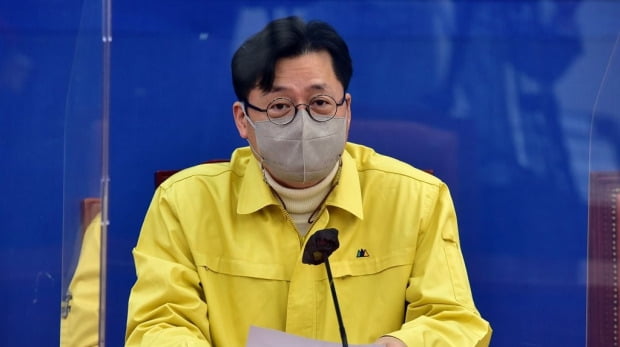
Photo = Yonhap News
Hong Ik-pyo, Chairman of the Democratic Party’s Policy Committee, said on the 16th, “If an additional budget is set up this year, the national debt ratio will increase to 52-53%.” It is said that the national debt ratio will be raised by 4 to 5 percentage points from the originally planned 48%, which will increase the national debt by up to 105 trillion won. The’era of 1,000 trillion won in national debt’ will also become a reality this year. It means that even if the financial soundness deteriorates to this extent, it will be unconventionally released, but there is growing criticism that “I think it is too light to increase the burden of future generations.”
Chairman Hong appeared on KBS Radio on the day and said, “This year, Korea’s national debt ratio is in the mid-to-late 40% range, and even more aggressive fiscal expansion policies can handle it.” He said, “If an additional supplement to cover disaster subsidies is added, the national debt ratio is expected to increase to 52-53%.”
Korea’s national debt was 84.89 trillion won at the end of last year, and the ratio of national debt to gross domestic product (GDP) was 44.2%. This year, the national debt is expected to increase to 956 trillion won and the national debt ratio to 47.8% based on this budget. Chairman Hong’s words mean that the government will further raise the national debt ratio to 52-53% by organizing the extra budget on a sufficient scale.
According to these words, the national debt at the end of this year will increase by 85 to 105 trillion won from the original plan. This is equivalent to the national debt (109 trillion won), which is increasing from this year’s budget. Reflecting this, the national debt at the end of this year is expected to be 1041 trillion won to 1061 trillion won. The point of surpassing KRW 1,000 trillion in national debt, expected next year, will be one year ahead.
When a moderator pointed out that “the concern about fiscal soundness may increase,” Chairman Hong said, “If we increase economic growth through active fiscal policy, our fiscal soundness will be better.” The denominator of the national debt ratio is GDP. It is said that raising GDP through fiscal policy will eventually lower the national debt ratio. When a warning about the speeding of debt debt came out last year, the ruling party’s’good debt loan’ was once again brought out.
To increase the national debt by an additional 85 trillion won to 105 trillion won is equivalent to organizing an additional budget to that extent. It is well above the original forecast of 20 to 30 trillion won. Chairman Hong also presented a plan on how to fill in the contents of the supplementary administration.
He said, “We need to increase the amount and expand the scope of support compared to the existing disaster subsidies.” The 3rd disaster support fund was paid between 1 million and 3 million won, and the plan to increase it to 2 million to 6 million won was cited as an example. Chairman Hong emphasized, “The scope of support that was limited to small business owners and small and medium-sized business owners is looking for a wide range of support to street vendors, tourism and travel businesses, and cultural and artistic organizations.”
He also suggested that he needed symptoms. Chairman Hong argued, “When talking about fiscal soundness, we shouldn’t just talk about reducing expenditures,” he argued. “We should also talk about how to secure tax sources for necessary financial expenditures in a balanced way.”
Reporter Seo Min-joon [email protected]
Ⓒ Hankyung.com prohibits unauthorized reproduction and redistribution
